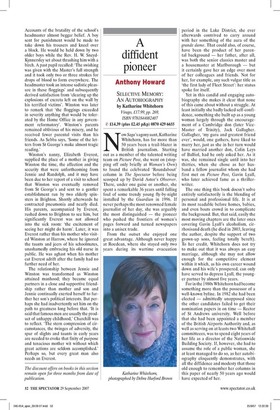A diffident pioneer
Anthony Howard SELECTIVE MEMORY: AN AUTOBIOGRAPHY by Katharine Whitehorn Virago, £17.99, pp. 269, ISBN 9781844082407 £14.39 (plus £2.45 p&p) 0870 429 6655 Now Saga's agony aunt, Katharine Whitehorn, has for more than 50 years been a trail-blazer in British journalism. Starting out as a member of the talented writing team on Picture Post, she went on (stopping off only briefly at Woman's Own) to found the celebrated 'Roundabout' column in The Spectator before being scooped up by David Astor's Observer. There, under one guise or another, she spent a remarkable 36 years until falling foul of some trendy young fly-by-night installed by the Guardian in 1996. If never perhaps the most renowned female journalist of her day, she was arguably the most distinguished — the pioneer who pushed the frontiers of women's pages forward and turned newspapers into a unisex trade.
From the outset she enjoyed one great advantage. Although never happy at Roedean, where she stayed only two years during its wartime evacuation period in the Lake District, she ever afterwards contrived to carry around with her something of the aura of the grande dame. That could also, of course, have been the product of her parental background — her father, after all, was both the senior classics master and a housemaster at Marlborough — but it certainly gave her an edge over most of her colleagues and friends. Not for her, for example, any such vulgar title as 'the first lady of Fleet Street': her status spoke for itself.
Yet in this candid and engaging autobiography she makes it clear that none of this came about without a struggle. At least initially she badly lacked self-confidence, something she built up as a young woman largely through the encouragement of a Cambridge don (later ViceMaster of Trinity), Jack Gallagher. Gallagher, 'my guru and greatest friend ever', would, one gathers, have liked to marry her, just as she in her turn would have married another don, Colin Leys of Balliol, had he only asked her. As it was, she remained single until into her thirties, when she chose as her husband a fellow journalist whom she had first met on Picture Post, Gavin Lyall, who later achieved fame as a thrillerwriter.
The one thing this book doesn't solve entirely satisfactorily is the blending of personal and professional life. It is at its most readable before homes, babies, and even boats crowd in to complicate the background. But, that said, easily the most moving chapters are the later ones covering Gavin Lyall's alcoholism, cirrhosisand death (he died in 2003, leaving the author, despite the support of two grown-up sons, feeling totally bereft). To her credit, Whitehorn does not try to make out that it was always an easy marriage, although she may not allow enough for the competitive element within it which, as his own career wound down and his wife's prospered, can only have served to depress Lyall, the younger partner by almost five years.
For in the 1980s Whitehorn had become something more than the possessor of a well-known byline. In 1982 she had been elected — admittedly unopposed since the other candidates failed to get their nomination papers in on time — Rector of St Andrews university. Well before that she had been appointed a member of the British Airports Authority and, as well as serving on at leasts two Whitehall committeees, was to spend eight years of her life as a director of the Nationwide Building Society. If, however, she had to assume the role of a public woman, she at least managed to do so, as her autobiography eloquently demonstrates, with all the diffidence and modesty that those old enough to remember her columns in this paper of nearly 50 years ago would have expected of her.























































 Previous page
Previous page